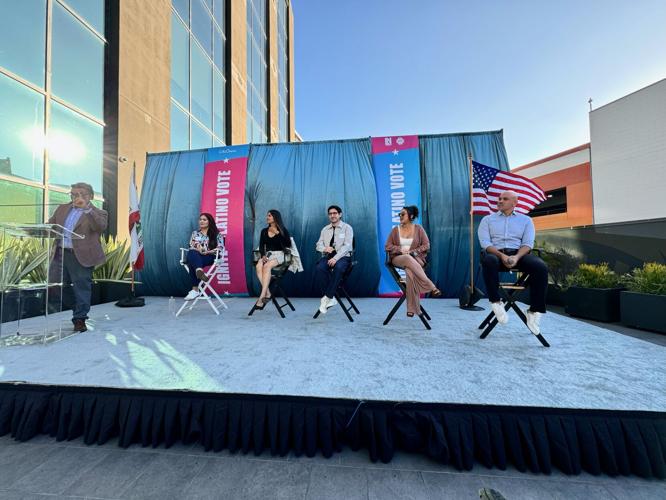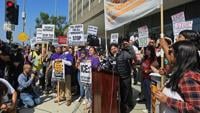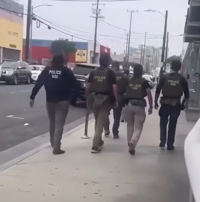
Panelists at Thursday’s fourth Diálogo in Los Angeles’s Little Tokyo. Photo by Martin Albornoz
With less than 70 days from the 2024 Presidential Election, CALÓ News, the Latino Media Collaborative (LMC) and LatiNAtion hosted a fourth Diálogo on Thursday, August 29 in Los Angeles’s Little Tokyo.
The event, titled “Igniting the Latino Vote,” focused on the importance of reenergizing the Latino vote and harnessing its potential as a powerful force for change in the upcoming election season. This month’s Dialogo was part of the ongoing Diálogo Series, a regular convening space for discussion and dialogue on the most pressing issues for Latinos and community leaders.
The approximately 75 attendees learned about the importance of Latino votes, strategies to help young voters become a powerful force of change and the pressing issues that many Latinos and people of color face and care about when it comes to not only presidential elections but local and regional elections as well.
Speakers and panelists included Mike Alfaro, creator of Millennial Loteria, a modern update to the classic Latinx card game; Constanza Elieana Chinea, a journalist, producer and activist who has founded Malcriá Media, an independent media platform focusing on social justice, politics and culture, centered on marginalized perspectives; Flor Martinez, a social media influencer and activist, founder of The Celebration Nation Foundation and organizer of many social and political actions since the age of 12; Lizette Escobedo, vice president of government relations and civic engagement at AltaMed Health Services; and Rafael Agustin, writer on the award-winning TV show “Jane The Virgin” and the author of the bestselling memoir “Illegally Yours.”
The Diálogo began with open remarks from the event’s moderator, Marcelo Gaete, the executive vice president of public and government affairs at Entravision Communications Corporation, a global leader in advertising, media, and ad-tech solutions. Gaete, who has extensive experience in political and non-partisan campaigns, began the panel by referring to Proposition 187.
The 1994 anti-immigration proposition known as the “Save Our State” initiative was designed to deny almost every state social service to undocumented immigrants. It would prohibit them from receiving a public K–12 education, non-emergency public health care or any other public social service. The bill, which was championed by former California Governor Pete Wilson and the state Republican Party, would obligate schools, health care facilities and their employees to report the status of these immigrants to federal authorities.
“At that time, [California] had 1.8 million Latino registered voters, only 12 percent of all the voters in California,” Gaete said. “Today, a quarter of all Latino voters reside in California.”
Gaete also drew comparisons between the anti-immigration proposition with signs and sentiments in the recent Republican National Convention. “Hundreds of people were holding up signs that said ‘Mass Deportation.’ That's what the stakes are today, very similar to 30 years ago,” he said.
When it comes to engaging young Latino voters to become more active in elections, Alfaro said that when he talks to the young people that follow him on social media, he doesn't talk to them as Latinos but as friends who might be his same age. “Many do not define themselves as Latinos. Their community is multicultural. They do not only think of themselves as only Latinos. I always tell people if you want to target [young] Latinos, do not do it through identity politics; do it through what they care about,” he said.

Attendees of last week's Dialogo. Photo by Martin Albornoz
Agustin talked about what Latino power means within local representatives and that oftentimes, just because someone is Latino, it does not mean they have the best interest for their constituents. “If you want to bring out the young voters, it is in longer about identity politics,” he said. “[Young voters] are much savvier than that.”
Escobedo also talked about the importance of educating Latinos and young people when it comes to their local, state and presidential elections. “These systems were not built for us to be included, so I think it's very important to understand how to navigate the [election] process, how we become the candidates who are on the ballot, not just in the presidency but in the state, congress, city council and board of supervisors,” she said. “It’s really important to have that education for young people. I feel very hopeful and inspired by this next generation.”
Chinea shared some of her findings and what she has heard from Latinos through her work as a journalist. She talked about the two-party system and the duopoly, which many young people do not feel identified with. “Young Latinos are very politically inclined. They are very smart. With the introduction of social media in the last decade, we have seen how much engagement can happen with young voters,” she said. “However, that also comes with the fact that they are much more vocal about how the two-party system is not working for them.”
Chinea also challenged the idea that Latino voters do not care about foreign policy. “It's a misconception that Latino voters do not care about foreign policy; they absolutely do,” she said. “When it comes to Palestine, a lot of Latino voters, specifically young voters, have been out in the streets fighting for it for over a year.”
Martinez, who is known for her revolutionary activism both in person and online, talked about the importance of being on the frontlines in marches and protests. “It’s important for people to show up to these demonstrations, because oftentimes that is how we make our voices heard on what is important for us and what are the changes we would like to see,” she said.
Martinez, who is currently under DACA and remains undocumented and unable to vote, said her voice is her vote and reminded everyone of the power immigrant Latinos have. “Even if not through voting, they have the power to call their representatives to urge them to pass certain laws. They have a voice to go out there and shout from the top of their lungs during marches and rallies,” she said. “We all have a voice, and we can all do something, even if that is signing a petition online, sharing a post,or getting others to vote.”
Research points to a younger Latino voter block that shows up less at the ballot box, not seeing tangible solutions on the pressing issues that impact their families, and feeling disconnected from the political class. Our panelists on August 29th discussed their analyses of what motivates Latinx people to engage with local and national politics, and how we can all reach for each other in a national moment of stress and discord.
Looking to attend events like those in our Diálogo series? Find out more about the next event and similar ones at our website: CaloNews.com
For those who are able to vote, Martinez said it is important to use that privilege and responsibility. “Do it for us; do it for the immigrant community that does not have that chance,” she said.
The event also featured special guests, including Comedy Central’s Al Madrigal, cartoonist Lalo Alcaraz and DJ Vick Jagger, who constructed the musical atmosphere for the evening.
Madrigal, who has been featured in all of CALÒ News’s and LatiNation’s “Stop the Dis(Information)" campaign, was present at the event’s media lounge talking to attendees about combating the widespread dissemination of disinformation, hoaxes and fake news that in recent years have cycled through the Latino community.
Short videos that make up the “Stop the Dis(Information)" campaign were played throughout the night to inform, educate and give people the tools to fight the spread of disinformation. The campaign was originally made to share high-quality content that will enhance digital media literacy, focused in time for the 2024 general election.
“It's something that I could not say no to because of how much misinformation is being spread everywhere, all the time,” Madrigal said when asked about how he feels about being the official face of the campaign. “1.8 million Latinos become eligible to vote every single year; you can see why forces are trying to disrupt those 1.8 million from voting. It's clear to me that we had to do something to make sure we got some information out there about disinformation,” he said.
For additional information on the Diálogo Series and if you would like to donate to LMC's effort to advance an informed and highly engaged Latino community through a thriving Latino media sector, visit latinomedia.org/2024-dialogo-series.













(0) comments
Welcome to the discussion.
Log In
Keep it Clean. Please avoid obscene, vulgar, lewd, racist or sexually-oriented language.
PLEASE TURN OFF YOUR CAPS LOCK.
Don't Threaten. Threats of harming another person will not be tolerated.
Be Truthful. Don't knowingly lie about anyone or anything.
Be Nice. No racism, sexism or any sort of -ism that is degrading to another person.
Be Proactive. Use the 'Report' link on each comment to let us know of abusive posts.
Share with Us. We'd love to hear eyewitness accounts, the history behind an article.